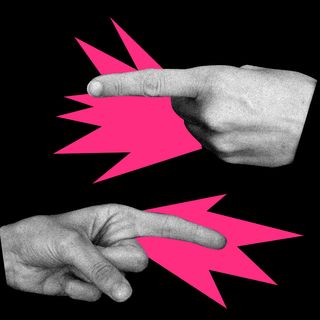Michaela Coel’s I May Destroy You starts as a messy, uncomfortable and emotional dramedy, fictionalized on Coel’s own sexual assault that happened when she was writing her hit cringe comedy series Chewing Gum. The show ends having dissected the complicated, often ugly journeys people go through in trying to come to terms with their trauma. The show follows Arabella (Coel), and her friends Kwame (Paapa Essiedu) — who is a Grindr-addicted, black man dealing with his own sexual assault — and Terry (Weruche Opia), a struggling actress who tasks herself with helping both of her friends heal from their trauma. Through these three primary characters, I May Destroy You revolutionizes the portrayal of survivors of sexual assault — how they behave, what they desire, and how they handle trauma, with their imperfection at the center, to be tackled and normalized in equal measure.
Arabella, for example, is an up-and-coming novelist and social media personality who goes through several phases of shock, grief, and anger after a stranger in a bar, who she can’t quite recall or identify, drugs and then rapes her. She pretends she’s alright until the flashes of memory become unbearable; she tries to constantly surround herself with friends, as the thought of being alone prompts panic; and when she finally feels ready to acknowledge and deal with what happened to her, she takes solace in social media, becoming a rape survivor influencer of sorts. Arabella’s initial solidarity with other sexual assault survivors quickly becomes a righteous, abrasive denouncement of all things men. As Arabella gains popularity, she seems to start weaponizing her victimhood, even against her friends, one of whom she’s aware has suffered through a similar experience as her. All the while, her character incites both empathy and disapproval from the viewer, engaging in actions completely justifiable, but insensitive just the same.
Related on The Swaddle:
#MeToo Is Making People Confront Their Trauma. And Most Are Ill-Equipped to Do So
Kwame, who faces Arabella’s wrath because he’s a man, is at once a victim to her and the man who assaulted him, a survivor to his friends, and a perpetrator for having had sex with a woman under false pretenses. At the end of a deeply uncomfortable, confrontational scene, however, Coel centers both Arabella’s and Kwame’s relationship, and their healing, bolstered by their shared understanding of having suffered similar trauma. In this imperfection, I May Destroy You introduces the idea of being responsible in one’s vulnerability — Coel’s writing doesn’t mollycoddle the characters who have survived sexual assault, which departs from mainstream portrayals of survivors as volatile or without agency, who need to be tiptoed around and given absolute passes to, no matter what they do. Arabella and Kwame are shown as being responsible for their healing, and their behavior, even as they struggle with finding a normal for themselves and their relationships.
In the same vein, however, the show never depicts the methods they use to navigate their trauma as either right or wrong, but merely messy. The show straddles a thin line quite effectively, on the one hand making the viewer realize that both Arabella’s and Kwame’s attitudes are harmful at times, while on the other making it clear they can take their time toward finally assuming responsibility — often done through the eyes of their third friend, Terry, who is seen upset, irritated and supportive toward both of them in the same breath.
The show attempts to destroy how we look at sexual assault survivors in the public eye — we’re quick to put them in boxes, to immediately either assign blame or ire. But I May Destroy You shows just how easy it is to demonize people to maintain our own black-and-white realities, and just how deeply discomfiting it is to accept nuanced, multiple sides of every individual, the good and the bad. The beauty of I May Destroy You is that Coel makes it impossible for us to draw conclusions about the characters in flux, except for how trauma survivors need care, support and attention, no matter how ugly their healing processes may be.
Ultimately, the show, in an intelligent, self-aware and often witty manner, drives home the point that trauma manifests in all shapes and forms, and requires immense care, attention and responsibility to tackle — not just from friends and family, but more importantly from the person who is most affected by it.




